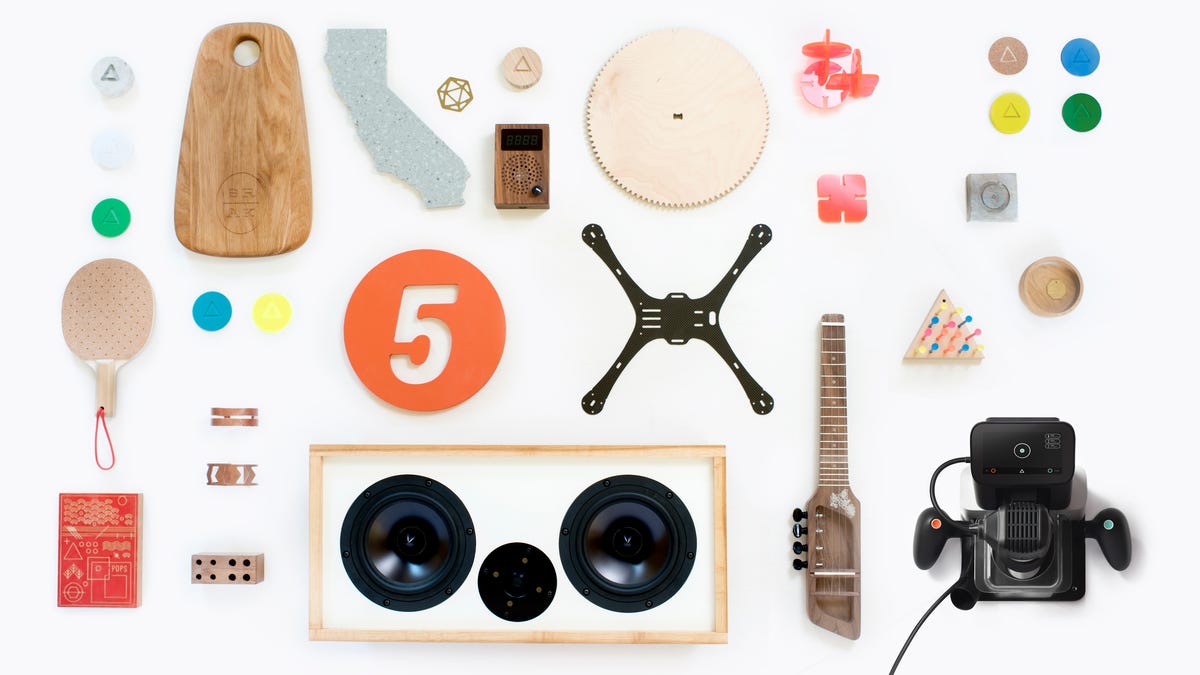A computer-boosted power tool for craftsmen and creators
With help from a camera and computer chip, the Shaper Origin can carve wood, metal and plastic into anything from furniture to jewelry boxes.

In a tidy workshop in San Francisco's Mission District, Joe Hebenstreit is surrounded by a curvy wooden chair, a carbon-fiber drone chassis, a beanbag-toss game, a copper bracelet, a carefully cut slab of kitchen counter top -- and the machine his company used to make all of them.
Hebenstreit, formerly the lead design engineer of Google Glass computerized eyewear, now is chief executive of Shaper. The nine-person startup on Monday night began sales of a camera-enhanced, computer-guided cutting tool called the Origin. It tracks its own location so it can handle high-precision positioning as it guides you through a job.
"It's like autocorrect for your hands," Hebenstreit said.
Shaper Origin, a computer-enhanced router and cutting tool
With a $1,500 early-sales price that'll rise to $2,099 when it's ready for retail sales, the Origin might not be for you, but Hebenstreit thinks it'll appeal to plenty of people: woodworkers, designers, furniture and cabinet builders, guitar makers, engineers, jewelry makers and others who need to quickly rough out prototypes or construct finished products.
And Shaper hopes the Origin will carve a new path through the technology world, too. For decades, computers have improved productivity by replacing people -- accountants, assembly-line workers, and with the coming era of artificial intelligence, perhaps composers, house cleaners and X-ray technicians, too. But Shaper hopes its robotic technology instead will boost human abilities.
"How can we develop these cheat codes to do things we couldn't do by ourselves?" he asked. "This is how humans and machines will interact with each other in the future."
The Origin is the mirror image of another creative trend, 3D printing. There, a computer-controlled device gradually builds an object, adding materials layer by layer. The Origin works by removing material, an outgrowth of traditional fabrication tools like lathes and milling machines.
Creators selling their works on Etsy might be inspired after seeing some what can be made with the Origin -- personalized kitchen cutting boards, a micro ukulele, a ping-pong paddle, a monogrammed pen holder, a brass pendant depicting an icosahedron. They might be even more encouraged when they find they can use the Shaper Hub to share and download fonts, cutting templates and patterns for hardware like a specific model of hinge.
But most folks won't jump aboard, said Futurum analyst Daniel Newman.
It's a "cool concept," Newman said, but likely a niche product rather than something mainstream. And for those who do want to transform raw materials into specific shapes, he expects a more traditional device, the CNC (computer numerical control) machine, will fit the bill. CNC machines are gradually moving toward requiring less or even no human interaction at all.
But Hebenstreit said the Origin can work on large projects that would take a garage-size CNC machine costing more than $35,000. And CNC shops have been enthusiastic in testing the Origin, which they say is good for quick work, he said.
Shaper CEO Joe Hebenstreit
It can carve wood, plastics, carbon fiber, kitchen counter top materials like Corian, and softer metals including copper, aluminum, and brass. Shaper plans to ship it starting September 2017 but won't disclose how many it hopes to sell.
Shaper Tools' nine employees worked on some high-profile products including the Apple TV and Tesla Model S electric car. Hebenstreit for four years led product design engineering of Google Glass and before that worked on Amazon's Kindle. Alec Rivers had the idea for Shaper in 2011 and Ilan Moyer cofounded the company with him in 2012.
Together, they have lots of experience designing products that can be manufactured well and that ship on time, Hebenstreit said. "We're taking the time to get this into people's hands."

